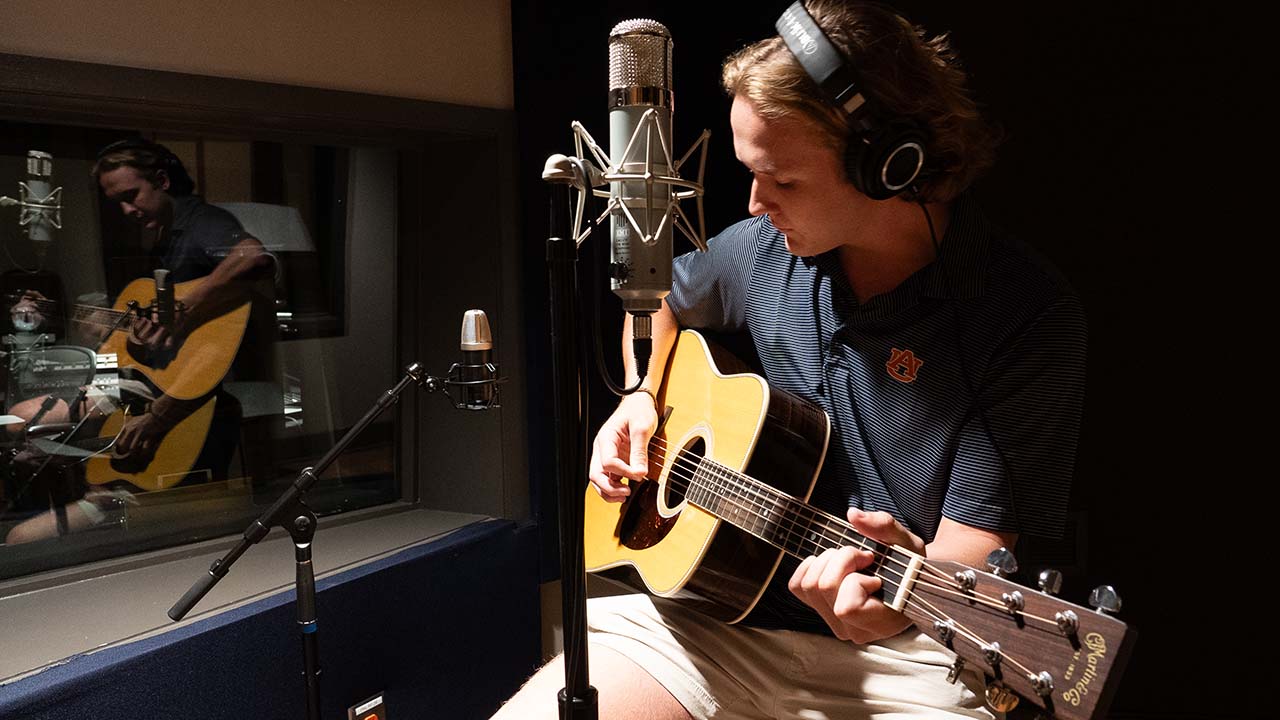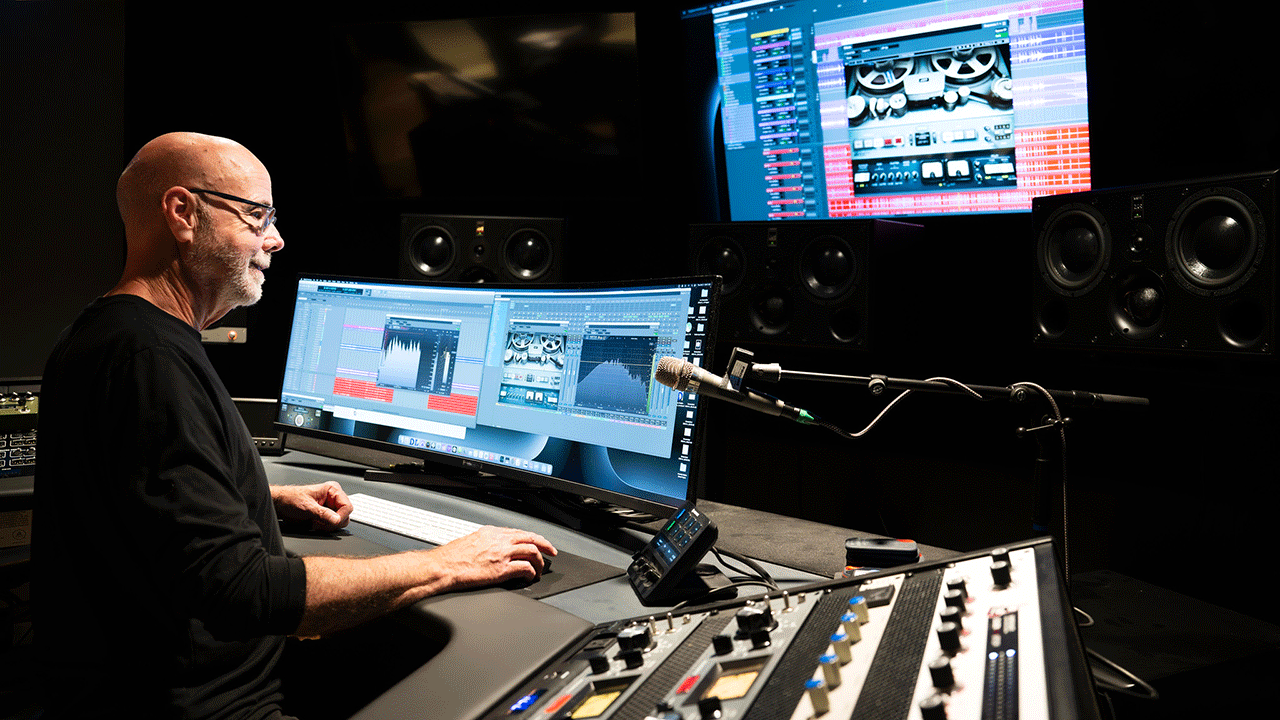content body
Growing up in the small farming community of Newton, Alabama, Don Clayton never imagined he would one day be a successful entrepreneur with an array of business holdings, but he always expected to be a musician. And from the time he was in the fourth grade, he also knew he would attend Auburn University.
Clayton, a 1975 music education graduate, has approached his career and life with equal parts strategy and whimsy. He’s a businessman with a plan — he’s a doer. But his first love is music and he’s more likely to tell you about a song he wrote, his family or a sailing trip than discuss his portfolio.
“Music has always been part of my identity. People would ask, ‘Who are you? What do you do?’” he said. “My answer was always, ‘Well, I’m a musician.’ I wore that like a badge of honor.”
The combination of business acumen, music passion and love of Auburn recently led Clayton to support the university’s first commercial recording studio in the College of Liberal Arts. Named after the title of one of his favorite self-authored songs, the Don and Alexandra Clayton "Lucky Man" Studio is poised to revolutionize opportunities for music students and put Auburn on the map in the recording industry.
“Don’s generosity has created an extraordinary hands-on learning opportunity for our students,” said Doug Rosener, professor and chair of the Department of Music. “Students are learning fundamentals, theory and practice in class, but the studio provides exposure to professional recording artists and a firsthand look at the business side of the industry. This has never been possible at Auburn — until now.”

Entrepreneur, musician and 1975 music education graduate Don Clayton and his wife, Alexandra, recently made a gift to establish the Lucky Man Studio, creating the first commercial recording studio at Auburn. (Photo courtesy of Don Clayton Music)
Rocking Auburn Roots
Clayton’s coming-of age-years in the late 1960s and 70s were filled with music from classic rock icons like Queen, Pink Floyd, the Allman Brothers Band, Lynyrd Skynyrd and the Eagles. He’s also a classically trained musician. His diverse, musical paths converged at Auburn where the 1970s music culture inspired his passion and vision and the Auburn University Marching Band instilled discipline.
“Auburn was so great for me as a young kid coming from a small, rural community,” he said. “I was a musician and able to play weekend gigs and I also played with the Auburn Knights for a short time. But my identity was the Auburn Band.”
Although the music scene has changed dramatically in the past few decades, today’s music students aren’t much different from Clayton and his peers — they love music, want to chase their dreams in the industry and maybe change the world while they’re at it.
The Lucky Man Studio will help Auburn’s music students achieve their goals, particularly if their ambitions include songwriting, performing or working on the business operations side of music.
Outside major music industry hubs like Nashville and Los Angeles, Auburn’s studio will be among the largest in the nation. The size, flexibility and state-of-the-art technology will attract commercial recording artists and provide a behind-the-scenes industry look for Auburn’s music majors, particularly those in the Department of Music’s two new majors — commercial music and composition with technology — and a new music business minor open to all students who want to work in the music industry, regardless of major or musical experience.

Senior music majors Emma Kennedy, Harry Downes and Sally Little take advantage of the acoustics and space of the Lucky Man Studio.
Amplifying Influence
Clayton gained firsthand experience managing a recording studio after graduating from Auburn. Opening a studio in Dothan, Alabama, with his brother and a few others, he made a living recording local and regional talent and commercial jingles, supplemented by playing at local events and in nightclubs and bars. Surprisingly, it was his work with jingles that caused a larger studio to take notice.
“I moved to Atlanta in 1977 to another recording studio and we were managing acts up and down the eastern seaboard,” Clayton said. “Young people from small towns all over Georgia, Alabama and the Deep South were moving there. It was a crazy special time because back then, Atlanta still felt like a really big, small town.”
Eventually, he craved a lifestyle a little more like his small-town upbringing and changed course with a move to the North Carolina mountains. The next 15-20 years were filled with building a family and a business rooted in sales and the hospitality industry. But music never left his heart or mind.
“It was one of the hardest things I’ve ever done — it felt like changing my identity,” Clayton said. “But I made a plan — if I wasn’t rich and famous by the time I was 30 then I had to get a ‘real’ job. I wasn’t a very good starving artist, so that’s what I did.”
After decades of business success, he is now free to pursue songwriting and performing, with a number of albums, videos and songwriting credits to his name. His unique combination of business and music industry knowledge made supporting Auburn’s recording studio an easy decision.
“I've always had the philosophy that of he who much is given, much is expected,” he said. “I was blessed in so many ways, so I believe I have a debt — a social debt.”
This belief is also evident in Clayton’s gifts to support Auburn’s Gogue Performing Arts Center, naming the Joyce Clayton Box Office Station to honor his mother and the Dr. Rick Good Control Room and Recording Booth, recognizing Auburn’s director of bands. Clayton has also made gifts to the band and the music department and established an endowed scholarship in the Education to Accomplish Growth in Life Experiences for Success, or EAGLES, program in honor of his nephew.
Setting the Stage
Rosener has big plans for the Lucky Man Studio, expecting it to transform the student experience for music majors, as well as attract recording artists from the region and nation and even international performers. Clayton also hopes the studio will become one of Auburn’s claims to fame, attracting working alumni and one day, producing work with ties to a Grammy Award.“Mr. Clayton’s support for this studio has been tremendous,” said Trammell Starks, renowned recording artist, composer and producer, as well as Auburn’s first full-time audio recording engineer. “We still have more to do to make this the world-class recording studio we envision, and philanthropy will continue to be the key to making it happen.”
Support from the Auburn Family is driving the creation of Auburn’s first recording studio and it will be the fuel that propels the studio to reach its greatest potential.
“I want to get people passionate about the studio, not only because it's a great place to help educate students and prepare them for work in the industry,” Clayton said. “But also, because it's something that could transform Auburn’s standing in the field. It could be like winning an SEC championship in terms of notoriety.”
Encouraging others to invest in the recording studio, Clayton believes creating a state-of-the-art space that can accomplish all of this and more will require the support of an ensemble rather than a solo act.
“It took many years for me to realize it, but Auburn was so developmentally important to me,” he said. “Once I started getting pulled back into the fold a few years back, I thought about how important those formative years were to the man I am today. I know Auburn has had that same kind of impact on so many others. I’m hoping they will join me in supporting something extraordinarily special at Auburn.”

Thanks to the Lucky Man Studio, Savanna Wilkinson, a high school student from Texas, experienced performing in a recording studio for the first time during her recent visit to Auburn's campus.
Help make musical history at Auburn by supporting the Lucky Man Studio!
Give Today!





